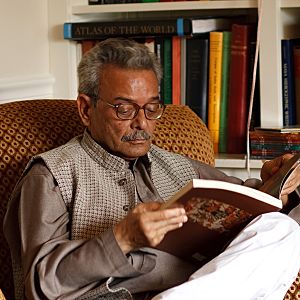Shamsur Rahman Faruqi facts for kids
Quick facts for kids
Shamsur Rahman Faruqi
|
|
|---|---|
 |
|
| Born | Shamsur Rahman Faruqi 30 September 1935 Pratapgarh, United Provinces, British India (now in Uttar Pradesh, India) |
| Died | 25 December 2020 (aged 85) Allahabad, Uttar Pradesh, India |
| Resting place | Ashok Nagar, Allahabad, beside his wife |
| Occupation | Poet, critic |
| Language | Urdu |
| Nationality | Indian |
| Alma mater | Allahabad University |
| Notable works |
|
| Notable awards |
|
Shamsur Rahman Faruqi (born September 30, 1935 – died December 25, 2020) was an important Indian Urdu writer. He was a poet, author, and critic who helped bring new ideas to Urdu literature. He created fresh ways to understand literature. These new ideas combined Western ways of looking at books with the special beauty of Arabic, Persian, and Urdu writing.
Some of his famous works include Sher-e-Shor Angez (1996) and The Mirror of Beauty (2013). He also edited and published Shabkhoon, a magazine about Urdu literature. Faruqi received the Padma Shri award in 2009, which is one of India's highest honors. He also won the Saraswati Samman in 1996 and the Sahitya Akademi Award in 1986.
Contents
Early Life and School
Shamsur Rahman Faruqi was born on September 30, 1935, in Pratapgarh, India. He grew up in cities like Azamgarh and Gorakhpur. He went to Wellesley High School in Azamgarh and finished high school in Gorakhpur in 1949.
He earned his first college degree, a Bachelor of Arts, from Maharana Pratap College in Gorakhpur. In 1955, he received his Master of Arts degree in English literature from Allahabad University. He started studying for a higher degree, a doctorate, but decided to stop.
Faruqi's Career and Writings
Faruqi started his writing journey in 1960. In 1966, he created the Urdu literary magazine Shabkhoon. He was the editor and publisher of this magazine for over 40 years. He also taught as a visiting professor at the University of Pennsylvania.
Besides writing, he worked for the Indian Postal Service. He retired in 1994 as a high-ranking official. Faruqi was very skilled in classical poetry rules and the art of poetic speech. He brought deep new ideas to Urdu literary discussions. Many people called him "the century's most iconic figure in the realm of Urdu literature."
Bringing New Ideas to Urdu
Faruqi is famous for bringing modernism into Urdu literature. He developed new ways to appreciate literature. He took ideas from Western literary criticism and changed them to fit the unique style of Arabic, Persian, and Urdu writing.
Through his works, he wrote about the Indian-Muslim way of life in the 1700s and 1800s. He believed that language should bring people together. He worried that language was sometimes used to divide communities. His magazine, Shabkhoon (meaning Ambush at Night), published new Urdu literature from 1966 to 2006. It aimed to support writers who wanted to try new things.
Faruqi also translated many of his own books into English. His 2013 novel, The Mirror of Beauty, was an English version of his 2006 Urdu novel Kai Chand The Sar-e Asman. This book told the story of Wazir Khanum, the mother of a famous Urdu poet. It was set in Delhi during the late 1800s. Another novel, The Sun That Rose from the Earth (2014), described the lively Urdu literature scene in Delhi and Lucknow in the 1700s and 1800s. It also showed how people stayed strong during the Indian Rebellion of 1857.
Reviving Storytelling
Faruqi is also known for helping to bring back Dastangoi. This is a 16th-century Urdu art form where stories are told orally. This storytelling art was very popular in India in the 1800s but seemed to disappear after 1928.
Working with his nephew, Mahmood Farooqui, Faruqi helped update this old art form. He led its return in the 21st century. Since 2004, Farooqui and his Dastangoi group have performed in India, Pakistan, and the United States.
Awards and Honors
Shamsur Rahman Faruqi received several important awards for his literary work:
- He won the Sahitya Akademi Award in 1986 for his book Tanqidi Afkar. This book focused on modern ideas about poetry.
- In 1996, he was given the Saraswati Samman. This is an Indian literary award. He received it for Sher-e-Shor Angez, a four-volume study of the 18th-century poet Mir Taqi Mir.
- He was awarded the Padma Shri in 2009. This is the fourth highest civilian honor in India.
Personal Life
Faruqi met his wife, Jamila Hashmi, when she was a student at Allahabad University. Jamila later started and managed two schools for girls from less wealthy families. They had two daughters, Afshan and Baran Faruqi, who are both academics.
Jamila passed away in 2007. Faruqi often said that his wife played a very important role in his career. He believed that without her support, he would not have been able to focus on his magazine and become the writer he wanted to be.
Shamsur Rahman Faruqi died on December 25, 2020, in Allahabad. He passed away due to problems from COVID-19. He was buried in the Ashok Nagar cemetery in Allahabad.
See also
 In Spanish: Shamsur Rahman Faruqi para niños
In Spanish: Shamsur Rahman Faruqi para niños
- List of Urdu language poets
- List of Urdu language writers
 | Selma Burke |
 | Pauline Powell Burns |
 | Frederick J. Brown |
 | Robert Blackburn |

